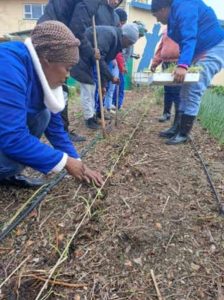The Butterfly Effect: Leaders inspiring change
08 Sep 2025
“Do not go where the path may lead, go instead where there is no path and leave a trail.” – Ralph Waldo Emerson
The Butterly Effect is a concept that emerged in the early days of Chaos Theory. It suggests that in a complex system (weather, ecosystems, organizations, etc.), a small change in initial conditions can lead to significant changes or outcomes that are difficult to predict – hence, the idea that a butterfly flapping its wings could hypothetically trigger a tornado a few weeks later.
At its core, Chaos Theory studies and seeks to understand complex, dynamic systems. It is also one of the founding concepts of Ikhala Trust’s approach to development, applied and honed over two decades.
Complex systems exhibit certain key characteristics: non-linearity (efforts and results may not be proportional); feedback loops (human responses shape outcomes); and, emergent patterns (even when things look disorganized, new structures and networks are forming, often more sustainably than is the case with top-down planning). In a community and social development context, Chaos Theory helps to explain why social change is rarely straightforward. Just as in nature, small actions can set off large, unexpected ripple effects in society.
The stories included in our new publication The butterfly effect: Stories of citizen-led development illustrate this concept – specifically, how the vision, ideas and efforts of one individual or small group, focusing on gifts, talents and potential, can lead to transformative change.
In practice, this means development work benefits from flexibility, adaptability, and continuous learning rather than rigid plans. By acknowledging uncertainty and interconnectedness, leaders and facilitators can better support resilient, self-organizing communities.
The other founding concept behind Ikhala’s development approach is rooted in a separate but linked concept, the concept of Appreciative Inquiry[1] (AI) – an approach to change and problem-solving that focuses on what works well, rather than only on what’s broken. Appreciative Inquiry emerged in the 1980’s from a foundational paper written by David Cooperrider and Suresh Srivastva at Case Western Reserve University.[2]
The paper introduced Appreciative Inquiry as both a theory (about how organizations grow through inquiry) and a method (a way of asking questions and leading change).
It has since inspired a global movement in organizational development, leadership and community building, applied in businesses, schools, governments and community groups to help people move beyond conflict, build on strengths, and imagine hopeful futures together. Ikhala’s Asset-Based Community Development (ABCD) approach owes its origins to, and is fundamentally shaped by, the Appreciative Inquiry approach.
ABCD challenges traditional approaches to community development, which usually means looking for problems, diagnosing what is wrong, and trying to fix it. This “deficit-based” approach limits creativity and often reinforces negative cycles. Instead, we conceive organizations and communities as living, dynamic systems, shaped by people, ideas and shared meaning. We also flip the notion of enquiry – observing that the questions we ask determine what we find. If we only ask, “what’s wrong?”, we generate problem-focused answers. If we ask, “what’s working and what gives life?”, we generate positive, hopeful answers. ABCD is a “generative” approach, creating new possibilities and new realities, rather than just focusing on fixing yesterday’s problems.
These foundational concepts provide the background and themes of the leadership stories in The butterfly effect: Stories of citizen-led development. They explore how individuals, shaped by their communities and driven by shared values of fairness and justice, rose to lead with humility, courage and practical innovations.
Two stories showcase how NGOs (Hugs of Hope and the Co-op Community Trust) applied ABCD as a paradigm and practice. The third story highlights how a rural community – the Goboti Residents Association – organically discovered and leveraged local strengths and assets. Through the different stories, common threads around leadership, power and impact emerge. We explore what galvanizes people to initiate change, and the conditions and practices that support or obstruct change. Our working hypothesis that shifting our gaze away from a focus on problems and needs towards an appreciation of strengths and assets is a precondition for shifting power to communities in our society.
We hope you enjoy the stories and that they inspire you to further explore the frameworks they reference, and questions they pose.
Post-script
Just as the life-cycle of the grubby caterpillar into a beautiful, winged butterfly proceeds, organizations go through life-cycles. Shortly after this publication was commissioned, the Board of Trustees announced the formal dissolution of Ikhala Trust, due to financial pressures that had made continued sustainable operations impossible. The butterfly effect: Stories of citizen-led development, then, will be our final publication.
While this is a bittersweet phase, but as we mourn the closure of this amazing little organization that achieved so much with careful and conscious stewardship of our assets (including leaders, allies, networks and a “make it happen” attitude), we recognize that the cycle of life includes demise. Ikhala may be no more, but the ABCD story goes on, starting with the establishment of the newly hatched ABCD Africa Association. So, watch this space…the journey of transformation continues.
By: Bernie Dolley and Sarah Hugow, Ikhala Trust.
The Ikhala Trust was a micro-grant maker operating in the Eastern Cape Province of South Africa since 2002. Ikhala practiced and advocated a strengths-based approach to community development, simultaneously offering technical support and “small grants” to “small organizations” as stepping stones towards organizational and programmatic development. Ikhala was at the vanguard of advocating for Asset Based Community Development (ABCD), representing a fundamental paradigm shift in the social and community development field.
[1] Usually spelled “Enquiry” in South African / British usage.
[2] “Appreciative Inquiry in Organizational Life”: Research in Organizational Change and Development, 1987.





